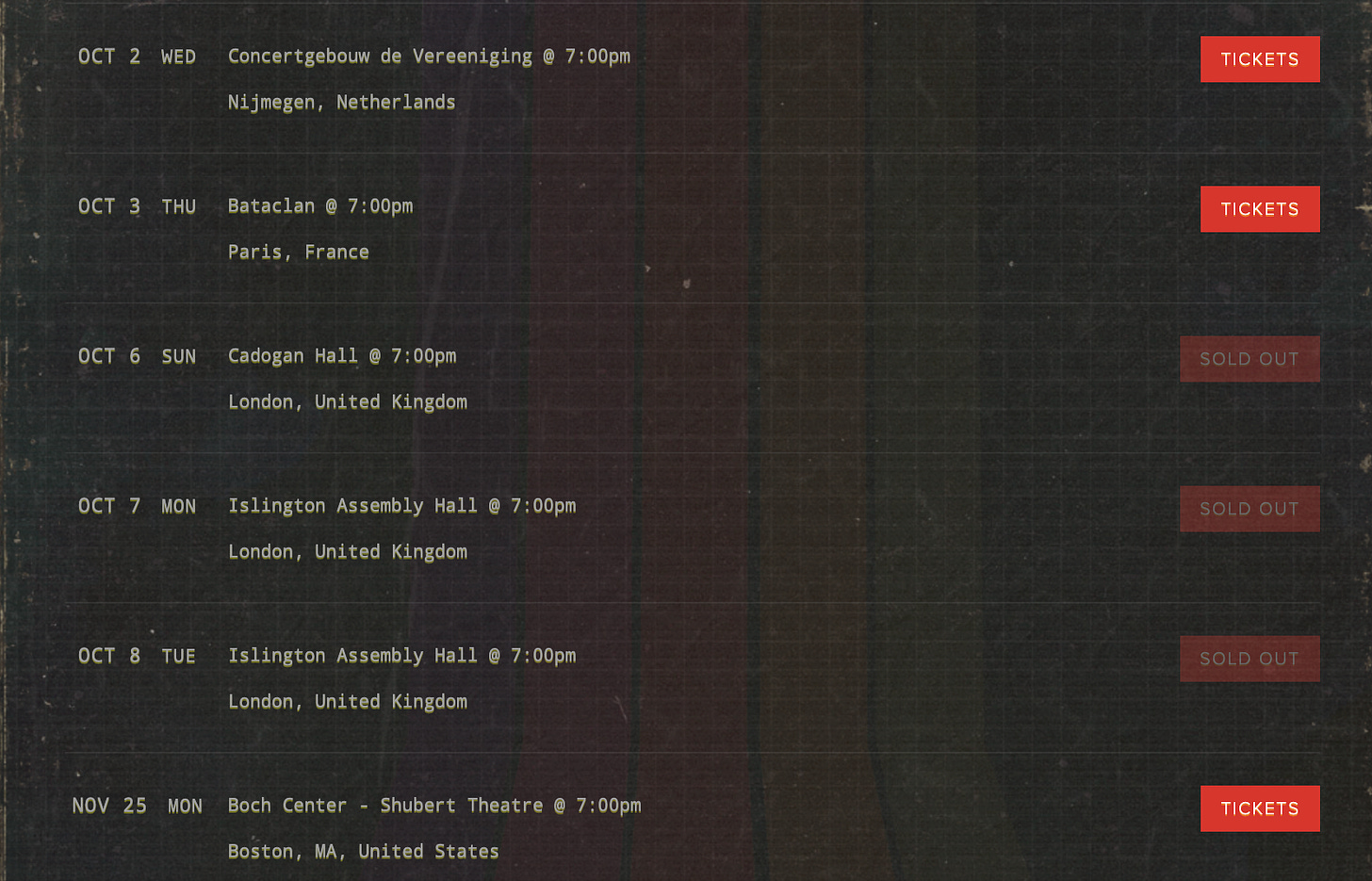Is it Possible to Predict a Hit Song? Mailbag
Answering questions about diss tracks, diminished chords, TV bands, and so much more.
As always, I answer reader questions the last Sunday of each month. This month, I got to investigate the invention of the diss track, how to predict hit songs, the prevalence of bands in TV shows, and so much more. If you have a question for next month, feel free to send it my way. If your question is selected, you get a premium subscription to this newsletter, which includes additional writing each week.
Amidst all his recent controversy, Kanye West’s new album Vultures is performing very well commercially. Does the court of public opinion have a significant impact on artists' livelihoods? - Dhruv
While the court of public opinion does impact the livelihood of artists — you can’t be popular if no one likes you — the pool of artists who were canceled and truly lost their careers is pretty small. Most cancelations seem to go the way of Ryan Adams.
In 2019, the New York Times published an expose on the singer-songwriter detailing accusations of sexual harassment. After denying the allegations, he issued an apology and then went into exile before reemerging not too long after. Now, he’s selling out theaters on a transcontinental tour.
There are certain artists who get truly canceled, like R. Kelly. The list of crimes the R&B singer has been convicted of are beyond disturbing. That fact that he was convicted is important, though. In most cases, it seems like a conviction is necessary for a true cancellation.
Does that mean we shouldn’t hold artists accountable for behavior that won’t send them to jail? Of course not. But I think people should be realistic about what the outcome of trying to cancel someone is and what our expectations are for allowing those people to come back into the public eye.
Is “How Do You Sleep?” by John Lennon the first diss track ever made? - Jon
Sometime in the first century, the Roman writer Martial wrote the following of Cinna, another Roman that had insulted him: “Cinna, I am told, is a writer of small squibs against me. A man cannot be called a writer, whose effusions no one reads.” This example of Martial dissing his fellow countryman is a good reminder that to diss is to be human.
Despite the fact that Martial’s name bears resemblance to Marshall Mathers (a.k.a. Eminem), the 21st century king of the diss, he was not a musician. And while I’m sure musical disses have been going on for centuries, I think John Lennon insulting Paul McCartney on “How Do You Sleep?” (i.e., “The only thing you’ve done was yesterday / And since you've gone, you're just another day”) is a distinct phenomenon because of the fact that it was recorded.
Before the advent of recording, songs weren’t necessarily associated with a particular person. A song could be written with the express purpose of insulting someone else, but that insult song would have to be performed by many people other than the writer in order to spread said insult far and wide.
So, the musical disses we are looking for are those from the era of recorded music, which is roughly after 1900. That said, I don’t think you’re going to find many diss tracks in the first half of the century. That era was still dominated by the idea that songs didn’t belong to particular artists. You’d have popular songs simultaneously released by multiple artists. If you have ten people recording the same “diss track” it would diminish the idea that the diss is directed from one musician to another.
“Answer songs” were popular at that time, though. For example, in 1902 you had the first recordings of the popular song “Bill Bailey, Won't You Please Come Home”. In that same year, other artists recorded the answer “I Wonder Why Bill Bailey Don't Come Home”. The latter does not involve any disses, but there are answer songs that begin to approach the contemporary diss.
In 1952, country singer Hank Thompson released “The Wild Side of Life”, a song lamenting a woman who chose nightlife over domestic life. Soon after, Kitty Wells put out an answer: “It Wasn’t God Who Made Honky Tonk Angels”. Not only does her song directly quote “The Wild Side of Life”, but it suggests that the infidelity of women is typically caused by men.
You might be able to make the argument that Wells isn’t dissing Hank Thompson, per se. Her song is really just a response. In that case, I think the best I can do for the first modern diss is “You Keep Her” by Joe Tex.
Joe Tex, a soul singer who would have some hits throughout the 1960s, began to feud with James Brown in 1950s. The feud escalated when Brown started dating and collaborating with Bea Ford, Tex’s ex-wife. When Brown’s relationship with Ford soured, he wrote Tex a letter saying that Tex could take her back. Tex responded with a song, “You Keep Her”.
To my ears, the 1962 release “You Keep Her” is pretty close to a contemporary diss, Tex even addressing Brown by name. Plus, the diss would lead to more issues. A year after the it came out, Tex imitated Brown on stage while Brown was there. Brown and his cronies allegedly returned with guns and attacked Tex and his crew. I haven’t been able to figure out if anybody was charged, but that extra context makes the diss feel very contemporary.
How will music hold up over the next two or three generations? For example, will Elvis and The Beatles eventually fade away into obscurity? - Brad
In 2019, a 17-year-old Billie Eilish appeared on Jimmy Kimmel Live and the titular host asked the burgeoning pop star if she knew who some stars of the 1980s were. While she knew who Madonna and Cyndi Lauper were, she had never heard of Van Halen, Huey Lewis, or Run-DMC. If you came of age during the Reagan years, her lack of knowledge might upset you. It probably shouldn’t.
“Jump” — Van Halen’s sole number one hit — topped the charts in 1983, 18 years before Billie Eilish was born. Being mad at her for not being familiar with Van Halen would be the same as being mad at someone born in 1967 for not being familiar with Vaughn Monroe or Vic Damone, two of 1949’s big hitmakers.
Forgetting the fact that Eilish might be familiar with some Van Halen songs even without knowing their name, her lack of knowledge is a good reminder that all pop culture fades away, even the pop culture that seems ubiquitous. The same thing will not only happen with The Beatles and Elvis Presley, but it is already happening.
In 2020, for example, Rolling Stone reported that the Elvis Presley estate had seen revenues fall 30%. That doesn’t mean that when you look up the music of the 1950s that Elvis’s photo won’t be there. It just means that forthcoming generations won’t being spinning his records and buying his memorabilia in the same way people did who witnessed The King live.
For some more information on this topic, I’ve written a bit about it in my pieces “Curating Songs for the Deceased” and “How to Get a Record Deal Without Playing a Show: Mailbag.” Check those out if my answer left you wanting more.
Are there proven methodologies to predict if an album will be a hit? - Riccardo
Keep reading with a 7-day free trial
Subscribe to Can't Get Much Higher to keep reading this post and get 7 days of free access to the full post archives.





